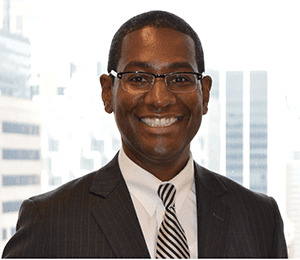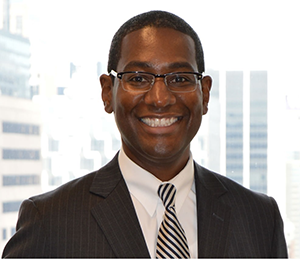
What has been your career path?
My role as a CLO for JPMorgan Chase, specifically with our consumer community banking business, is a bit nontraditional. I didn’t come up through a normal HR program; I had the privilege to enter the bank through our management development program. I spent time in our consumer community banking group as a general manager moving through various roles, predominantly for our branch banking business. I also had the opportunity to move into our commercial bank, where I served as an underwriter and as a commercial banker lending to hallmark names in the New York marketplace. Additionally, I supported the business, specifically the commercial bank, as a client service manager for our global network. Having worked within the commercial bank for a number of years, I also transitioned back into business banking, which is one of the sublines of businesses within the consumer community bank. It was in that role where the opportunity to transition into the chief learning officer role emerged. It allowed me to meet and work with another set of leaders within business focused on some of the same goals and objectives as we think about truly enhancing and transforming the experiences that we deliver to our clients across the globe.
What attracted you to and continues to excite you about learning and development?
Learning is so exciting right now because it is bringing together so many dynamics that we see in the broader economy. Whether it is the technological revolution as we look at the learning management systems or as we look at more digital learning modalities. It is that capability that is helping us shape our competitive landscape. Equally important is how we partner with other disciplines to ensure that we are arming our employees with the right tool sets, the right procedures, the right systems that are going to enhance their careers in the various job families that we deliver value across.
What lessons have brought you here?
Lessons really manifested themselves at key transitions. Specifically, moving from one job role to the other. They’re more memorable, because that’s where there was more stress on me individually, more stress on the enterprise in terms of ensuring that I had the requisite skills and knowledge to perform effectively within the context of that new role. As with any transition, there’s a material learning curve in many cases as individuals move to do other activities. Understanding that we recognize that learning curve, that we accelerate our ability to move up that learning curve, in many respects allows us to differentiate ourselves and deliver value faster to our customers and to the enterprise. I think about those transitions in my role from teller to branch manager, from branch manager to sales manager. Certainly, from leaving the consumer community bank going into the commercial bank as a credit underwriter and moving through credit training. Those are experiences that I draw on today as I face new challenges, as I think about bringing together the right team members to address those challenges.
What will the CLO role look like in five or 10 years?
The CLO role in five or 10 years will continue to evolve in a way that allows the chief learning officer to work much more in an integrated fashion with our chief information officers and chief marketing officers. This notion of lifelong learning, this notion of continuous learning, what some call learning agility, has never been more critical. It’s not just what it is we’re teaching, but it’s also critically important how we’re teaching it. What are the learning modalities that we are maturing and delivering across the enterprise? To do that effectively, the chief learning officer and the partnership with our chief information officers, with our chief marketing officers within the enterprise, will become even more critical and certainly I believe will enable us to deliver transformative value to our enterprise by really enhancing the performance of our people and increasing their success and ability to contribute effectively to our customers.
What is your most important career advice?
As I think about career advice, I think about it not necessarily through the lens of multiple jobs that individuals need to navigate through, but more through the lens of the skill sets and capabilities that need to be matured. I also view it in a more pragmatic way, in terms of a T-shaped diagram, where the broad horizontal are the soft skills that we need to navigate effectively. Specifically: communication, collaboration and executive presence. I’ve used the deep domain expertise as those types of capabilities that’ll allow us to be much more consultative and allow us to partner with the C-suite as we attempt to understand their key performance objectives and deliver learning capabilities that allow us to progress toward them, if not exceed them.














